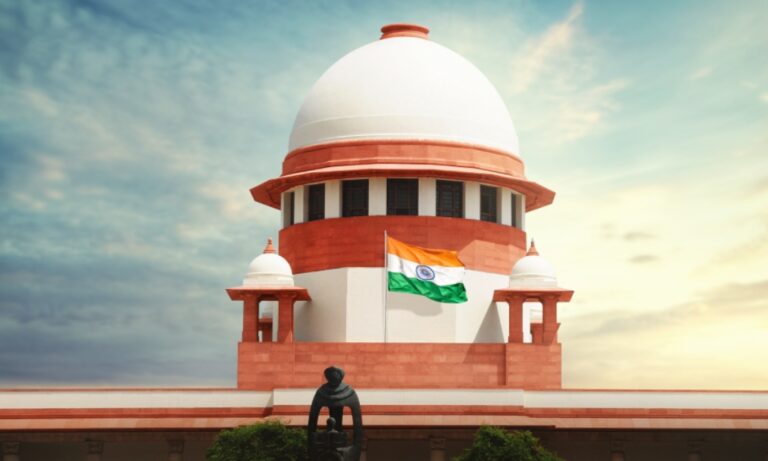The Supreme Court of India has sought a response from the Union Finance Ministry on a petition questioning the constitutional validity of the Securities Transaction Tax (STT). The plea, filed by trader Aseem Juneja, challenges the legality of the STT, claiming it amounts to double taxation and violates fundamental rights guaranteed under the Constitution.
According to the petition, traders are subjected to both STT and capital gains tax on the same transaction, which the petitioner argues is unjust and unconstitutional. The plea further contends that the STT is punitive in nature, as it is levied even when a trader incurs losses in share transactions.
The petitioner has also alleged that the imposition of STT violates the right to equality under Article 14 and the right to livelihood under Article 21 of the Constitution. The Supreme Court, after hearing the preliminary submissions, has issued a notice to the Finance Ministry seeking its response on the matter.
The case is expected to have far-reaching implications for stock market traders and investors, as it questions the legal foundation of a tax regime that has been in force since 2004.
Here are more detailed, upto-date facts about this case of Aseem Juneja v. Union of India.
Case Details: Aseem Juneja v. Union of India (W.P.(C) No. 657/2025)
Parties & Bench
- Petitioner: Aseem Juneja, a stock market trader.
- Respondent: Union of India (Ministry of Finance) among possible others.
- Bench: Justices J. B. Pardiwala and K. V. Viswanathan.
Nature of Plea
- The petition challenges the constitutional validity of the Securities Transaction Tax (STT) under the Finance Act, asserting several violations of fundamental rights and principles of taxation.
- Case number is Writ Petition (Civil) No. 657 of 2025.
Key Arguments in the Petition
Here are the grounds on which the petitioner argues STT is unconstitutional:
| Ground | What the Petition Argues |
|---|---|
| Double Taxation | Trader pays STT on the transaction (both buying and selling for “delivery trades”) and pays capital gains tax (short-term or long-term) on profit from that same transaction. Petitioner says this amounts to being taxed twice for the same underlying economic event. |
| Punitive Nature / Arbitrary Levy | STT is levied even if the trader makes a loss. It is imposed on the transaction value (the rupee amount of shares bought or sold), not on profit. According to the petitioner, this makes the tax arbitrary and “punitive or deterrent” in nature – unlike most taxes in India which focus on profit at the year end. |
| Violation of Fundamental Rights | The petition claims STT infringes: 1. Article 14 – Right to Equality (because the tax regime treats similarly situated persons differently or imposes an arbitrary burden). 2. Article 19(1)(g) – Right to practise any profession, trade or business. 3. Article 21 – Right to livelihood / life with dignity. |
| Comparison with Other Jurisdictions | The petitioner notes that major financial markets—USA, Germany, Japan, Singapore—do not have an STT-like tax on buy/sell transactions in securities. This is used to argue that STT is not necessary, or is out of step with international norms. |
| Lack of Adjustment or Refund | Unlike TDS (Tax Deducted at Source) for salaried individuals, where excess is adjusted/refunded at year end, there is no mechanism to adjust STT paid against capital gains tax liability. Thus, STT simply adds to the tax burden with no relief even in unprofitable trades. |
What the Court Has Done So Far
- The Supreme Court has issued notice to the Union of India (through the Finance Ministry), asking for a response.
- The notice has been made returnable in four weeks. That is, the government must file its counter-arguments within approximately a month.
- The Court has explicitly recognised that the petition challenges more than just the quantum/level of the tax; it questions whether this form of tax (STT on transaction instead of profit) is constitutionally permissible.
Technical & Legal Context
- What is STT?
STT is a tax imposed on transactions in securities (e.g., purchase and sale of stocks) executed on recognized stock exchanges in India. It was introduced in 2004 as part of measures to discourage tax evasion in stock market transactions. - Rate & Scope
For “delivery trades” (i.e. where securities are taken delivery, not merely intra-day/in trading), STT is levied at 0.1% on both buy and sell sides. - Capital Gains Tax
Traders also pay Short-Term Capital Gains (STCG) tax or Long-Term Capital Gains (LTCG) tax on profit realised from those transactions. These are profit-based taxes.
Possible Remedies Sought by the Petitioner
The petition asks for either/or:
- A declaration that STT is unconstitutional and therefore struck down.
- Alternatively, the Court may direct that the STT paid during a financial year be adjusted/offset against the taxpayer’s capital gains tax liability (short-term or long-term), in a manner like how TDS works for other professions.
Significance & Implications
- If upholds, this case could reshape how securities transactions are taxed in India; could reduce cost of trading for many market participants.
- Could prompt amendments to the Finance Act or the STT law/regulations.
- Could have revenue implications for the government, since STT is a source of revenue.
-
May set precedent regarding what kinds of taxes are permitted under constitutional constraints (profit-based vs transaction-based, mandatory irrespective of profit or loss, etc.).
